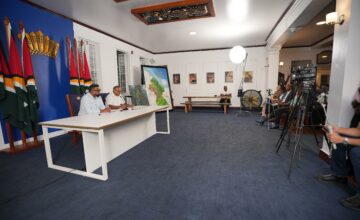
Urges Private Sector to reap benefits by becoming more ambitious, less risk-averse, more innovative
Georgetown, Guyana (March 30, 2021) His Excellency Dr Irfaan Ali promised the business community a tsunami of opportunities and charged them to put systems in place to reap the benefits.
He said that the Government sees the need for a thriving private sector and intends to continue dismantling barriers that impede business development whilst creating an enabling environment to enhance the ease-of-doing-business. Despite these initiatives, the Head of State was adamant that without innovation, cooperation and ambitious undertaking from businesses at all levels, the full effects of private sector development would not be reached.
President Ali made these statements during the feature address at the virtual 131st Annual General Meeting (AGM) of the Georgetown Chamber of Commerce and Industry (GCCI) this afternoon.
He pointed out that local businesses have an opportunity to turn the tide and to aid the country’s overall development, by promoting employment and modernisation. The President added that his Government recognises the link between democracy and economic freedom, and between economic freedom and investor confidence; and as such, commits to ensuring that democratic rights and freedom are upheld.
To aid business development, the President promised to remove the obstructing barriers.
“Bottlenecks, red tape with its tedious, multi-layered official procedures and administrative gridlock, all carry additional costs for businesses and harm their competitiveness. As such my Government is committed to dismantling barriers which act as a humbug to businesses.”
This, the President said, is part of enhancing the ease-of-doing-business that is encompassed by the seven-point National Development Plan that he had highlighted in November.
Another part of the development plan will be the implementation of an Electronic Single Window for Trade system that is aimed at reducing time and cost, simplifying trade procedures and eliminating duplication and unnecessary redundancy.
The Head of State said he has already discussed with the Mayor of Georgetown, Pandit Ubraj Narine, the development of a similar system that will allow for the processing of building permits and plans.
ANTI-CRIME STRATEGY
The President explained that the Government has also recognised the harmful effects of crime on the business community and is formulating a “robust anti-crime strategy to better protect businesses, communities and citizens”. These measures, he stated, are also aimed at improving the business community’s competitiveness—which is the “passport to enhanced business opportunities”.
He said that in this regard, “the Government is committed to supporting the private sector’s desire for greater competitiveness”.
President Ali emphasised that improved competitiveness requires a commitment to quality and noted that the National Quality Infrastructure (NQI) project aims to improve the quality of local products and services. As a result, it is anticipated that this will stimulate an increase in demand and bolster the ability of local firms to engage in regional and global trade.
As competitiveness is boosted, the Government is also seeking expanded and new markets for local goods and services. In this regard, a National Trade Policy is being crafted to support competitiveness and diversification through the dismantling of barriers to trade and competition.
SMALL BUSINESSES ARE VITAL
President Ali stressed that small businesses play a vital and indispensable role in economic development as they generate significant self-employment, and assist in sustaining growth and fostering the effective distribution of goods and services.
“Small businesses represent the arms and legs, propelling our economy forward, sustaining employment and acting as vital cogs in the distribution, marketing and consumption of goods and services of large businesses,” President Ali said, while emphasising that the Government is committed to supporting small business development.
This, he noted, is evident in the passing of the Small Business (Amendment) Bill 2020, which expands the range of procurement opportunities for small businesses.
“We have already granted small businesses a 5% advantage in bidding for state contracts. Also, the maximum threshold for grants disbursed by the Small Business Bureau through the Small Business Development Fund has been increased by 100%. We have committed to working with stakeholders to improve small businesses access to finance. In addition, our plans for small business development include the development of business incubators nationwide.”
This will also be supported by increasing opportunities for businesses through the Public Sector Investment Programme.
‘BIGGER, BOLDER, BRAVER AND BRAINIER’
President Ali said that the business community has proven itself over decades, to be adept and resilient. He recalled the community’s struggles after being crowded out by the public sector, import restrictions, lack of foreign exchange and consistent crippling power outages prior to the 1990s. However, in the ensuing years, which begun with the rebirth of democracy in 1992, the Head of State said that the business community has blossomed and is assuming its “rightful role as the driver of national growth”.
“The size of our economy is expected to more than double within the next ten years. This will result in an expansion of economic activities and, by extension, greater opportunities for the business community.”
With the expected exponential growth and transformation of the economy emerging, the Head of State charged the Private Sector to start thinking “bigger, bolder, braver and brainier,” by becoming more ambitious, less risk-averse, and more innovative.
The President emphasised that local businesses must position themselves to become part of the national economic transformation revolution, and to assume a state of readiness in order to seize the opportunities that will arise from the enlarging economy and revolutionising of the productive, services and manufacturing sectors.
“The business community must not only think local but also regional and international. Guyana’s economy is burgeoning and buzzing. The business community must grasp the opportunities provided by these developments so as to make inroads into regional and global markets. The expanding local market must become the springboard for extending the local business community’s reach into the larger international and global economies.”
The Head of State said that while there will be challenges to overcome, the longest journey starts not with the first step, but with the idea of the first step. As such, he implored that the time is now “to germinate the seed for the economic take-off of local companies in order for them to expand their reach into regional and international markets”.
RISE TO THE OCCASION
President Ali stressed that while the Government will support the private sector, it will not become its babysitter.
“Government will work to set the framework for fair competition, but it will not deploy overtly protectionist measures to shield the private sector from competition. The time has come therefore for the business community to rise to the challenges which lie ahead. Government will take steps to strengthen local competitiveness but in the final analysis and as Dr Debbie Mohamed of the University of the West Indies once observed, countries do not compete; it is firms that do.”
President Ali said it is up to local businesses to prepare for the bold new challenging times ahead as a “tsunami of opportunities” is coming their way and their reaction will determine their success.
“I know that 2020 was a difficult year, but I assure you that the worst of its economic effects are over. This is the time of recovery, rebounding, and a booming economy.”
ENHANCE BUSINESS RELATIONSHIPS
The President also spoke of the importance of local content in fostering cohesion and flourishing the business climate. He noted that although businesses will be competitive, their support for each other will be vital moving forward.
“Local content is action, not only by Government to ensure more opportunities are given to local businesses, but by local businesses encouraging and supporting each other wherever opportunities are. It is about local businesses and the local private sector coming together to create opportunities, to make use of opportunities, to help each other, to grow each other, to make each other more competitive. That is the only way Guyana will win. That is the only way we can build through local content. When the private sector becomes a supportive mechanism for each other.”
Additionally, the President also called for a better relationship between the private sector and the media, and less suspicion and more positive development between Guyanese, since the future would improve and enhance the lives of all.
“As a country and as a people, we have to support each other. We cannot always be suspicious of each other. We cannot always be negative about each other. Yes, we must question investment. Yes, it is important for us to understand the whole context in which development is taking place. But sometimes we spend too much time pulling each other down.”


